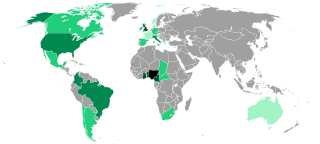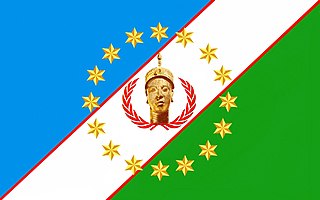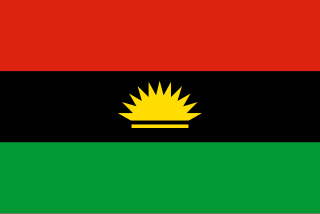
The Jihad of Usman dan Fodio was a religio-military conflict in present-day Nigeria and Cameroon. The war began when Usman dan Fodio, a prominent Islamic scholar and teacher, was exiled from Gobir by King Yunfa, one of his former students.

Islam is one of the two largest religions in Nigeria. Nigeria also has the largest Muslim population in Africa. In 2018, the CIA World Factbook estimated that 53.5% of Nigeria's population is Muslim. Islam is predominantly concentrated in the northern half of the country, with a significant Muslim minority existing in the southern region. Most of Northern Nigeria is governed under Sharia law, while the rest of the country is governed under secular law.

Lokoja is a north-central city in Nigeria. It lies at the confluence of the Niger and Benue rivers and is the capital city of Kogi State. While the Bassa Nge, Yoruba (Oworo) and Nupe are indigenous to the area, other ethnic groups, including the Kupa-Nupe, Hausa, Ebira, Igala, Igbo, Bini/Edo, and Tiv have recently established themselves. Lokoja is projected to be the third fastest growing city on the African continent between 2020 and 2025, with a 5.93% growth rate. It was listed as a second class township by the 1917 township ordinance of the colonial administration, indicating that Lokoja is an old city.

The culture of Nigeria is shaped by Nigeria's multiple ethnic groups. The country has 527 languages, seven of which are extinct. Nigeria also has over 1,150 dialects and ethnic groups. The three largest ethnic groups are the Hausas that are predominantly in the north, the Yorubas who predominate in the southwest, and the Igbos in the southeast. There are many other ethnic groups with sizeable populations across the different parts of the country. The Kanuri people are located in the northeast part of Nigeria, the Tiv people are in the north central, and the Efik-Ibibio are in the south South. The Bini people are most frequent in the region between Yorubaland and Igboland.

Maradi is the second largest city in Niger and the administrative centre of Maradi Region. It is also the seat of the Maradi Department and an Urban Commune.
Yauri is an emirate in Nigeria's Kebbi State, occupying the Yauri Local Government Area. Today, Yauri is one of the smallest historical emirates in Northern Nigeria. In 1972, the population was about 112,000 people inhabiting a land area of about 1,306 square miles (3,380 km2) and scattered over six major districts.
Gobir was a city-state in what is now Nigeria. Founded by the Hausa in the 11th century, Gobir was one of the seven original kingdoms of Hausaland, and continued under Hausa rule for nearly 700 years. Its capital was the city of Alkalawa. In the early 19th century elements of the ruling dynasty fled north to what is today Niger from which a rival dynasty developed ruling as Sarkin Gobir at Tibiri. In 1975 a reunited traditional sultanate took up residence in Sabon Birni, Nigeria.
Nigerian Americans are Americans who are of Nigerian ancestry. The number of Nigerian immigrants residing in the United States is rapidly growing, expanding from a small 1980 population of 25,000. The 2022 American Community Survey (ACS) estimated that 712,294 residents of the US were of Nigerian ancestry. The 2019 ACS further estimated that around 392,811 of these (85%) had been born in Nigeria. This puts the American-born Nigerian American population a little over 400,000. Similar to its status as the most populous country in Africa, Nigeria is also the African country with the most migrants to the US, as of 2013. In a study which was carried out by consumer genetics company 23andMe which involved the DNA of 50,281 people of African descent in the United States, Latin America, and Western Europe, it was revealed that Nigeria was the most common country of origin for testers from the United States, the French Caribbean, and the British Caribbean.

Jukun are an ethno-linguistic group or ethnic nation in West Africa. The Jukun are traditionally located in Taraba, Benue, Nasarawa, Plateau, Adamawa, Bauchi and Gombe States in Nigeria and parts of northwestern Cameroon. They are descendants of the people of Kwararafa. Most of the tribes in the north central of Nigeria trace their origin to the Jukun people and are related in one way or the other to the Jukuns. Until the coming of both Christianity and Islam, the Jukun people were followers of their own traditional religions. Most of the tribes, Alago, Agatu, Rendere, Goemai in Shendam, and others left Kwararafa when it disintegrated as a result of a power tussle. The Jukuns are divided into two major groups; the Jukun Wanu and Jukun Wapa. The Jukun Wanu are fishermen residing along the banks of the river Benue and Niger where they run through Taraba State, Benue State and Nasarawa State. The Wukari Federation, headed by the Aku Uka of Wukari, is now the main centre of the Jukun people.

The history of the territories which since ca. 1900 have been known under the name of Nigeria during the pre-colonial period was dominated by several powerful West African kingdoms or empires, such as the Oyo Empire and the Islamic Kanem-Bornu Empire in the northeast, and the Igbo kingdom of Onitsha in the southeast and various Hausa-Fulani kingdoms.

The Hausa are a native ethnic group in West Africa. They speak the Hausa language, which is the second most spoken language after Arabic in the Afro-Asiatic language family. The Hausa are a culturally homogeneous people based primarily in the Sahelian and the sparse savanna areas of southern Niger and northern Nigeria respectively, numbering around 86 million people, with significant populations in Benin, Cameroon, Ivory Coast, Chad, Central African Republic, Togo, Ghana, as well as smaller populations in Sudan, Eritrea, Equatorial Guinea, Gabon, Senegal, Gambia. Predominantly Hausa-speaking communities are scattered throughout West Africa and on the traditional Hajj route north and east traversing the Sahara, with an especially large population in and around the town of Agadez. Other Hausa have also moved to large coastal cities in the region such as Lagos, Port Harcourt, Accra, Abidjan, Banjul and Cotonou as well as to parts of North Africa such as Libya over the course of the last 500 years. The Hausa traditionally live in small villages as well as in precolonial towns and cities where they grow crops, raise livestock including cattle as well as engage in trade, both local and long distance across Africa. They speak the Hausa language, an Afro-Asiatic language of the Chadic group. The Hausa aristocracy had historically developed an equestrian based culture. Still a status symbol of the traditional nobility in Hausa society, the horse still features in the Eid day celebrations, known as Ranar Sallah. Daura is the cultural center of the Hausa people. The town predates all the other major Hausa towns in tradition and culture.
Ansar-ud-Deen Society of Nigeria is a Muslim organization established for the purpose of the educational development of Muslims and also as a body to enhance the moral and social development of the Muslim community in Lagos. It was founded in 1923 as a non-sectarian and non-political educational association, although there are doubts about its non-political stance.

Nigerians or the Nigerian people are citizens of Nigeria or people with ancestry from Nigeria. The name Nigeria was derived from the Niger River running through the country. This name was allegedly coined in the late 19th century by British journalist Flora Shaw, who later married Baron Frederick Lugard, a British colonial administrator. Nigeria is composed of various ethnic groups and cultures and the term Nigerian refers to a citizenship-based civic nationality. Nigerians are derived from over 250 ethno-linguistic groups. Though there are multiple ethnic groups in Nigeria, economic factors result in significant mobility of Nigerians of multiple ethnic and religious backgrounds to reside in territories in Nigeria that are outside their ethnic or religious background, resulting in the mixing of the various ethnic and religious groups, especially in Nigeria's cities. The English language is the lingua franca of Nigerians. Nigeria is divided roughly in half between Muslims, who live mostly in the north, and Christians, who live mostly in the south; indigenous religions, such as those native to the Igbo and Yoruba ethnicities, are in the minority.

The Yoruba people are a West African ethnic group who mainly inhabit parts of Nigeria, Benin, and Togo. The areas of these countries primarily inhabited by the Yoruba are often collectively referred to as Yorubaland. The Yoruba constitute more than 50 million people in Africa, are over a million outside the continent, and bear further representation among members of the African diaspora. The vast majority of the Yoruba population is today within the country of Nigeria, where they make up 20.7% of the country's population according to Ethnologue estimations, making them one of the largest ethnic groups in Africa. Most Yoruba people speak the Yoruba language, which is the Niger-Congo language with the largest number of native or L1 speakers.
Danja is a Local Government Area in Katsina State, Nigeria. Its headquarters is located in the town of Danja.

The Saro, or Nigerian Creoles of the 19th and early 20th centuries, were Africans that were emancipated and initially resettled in Freetown, Sierra Leone by the Royal Navy, which, with the West Africa Squadron, enforced the abolition of the international slave trade after the British Parliament passed the Slave Trade Act 1807. Those freedmen who migrated back to Nigeria from Sierra Leone, over several generations starting from the 1830s, became known locally as Saro(elided form of Sierra Leone, from the Yoruba sàró). Consequently, the Saro are culturally descended from Sierra Leone Creoles, with ancestral roots to the Yoruba people of Nigeria.

Communal conflicts in Nigeria can be divided into two broad categories:

Igbo nationalism is a range of ethnic nationalist ideologies relating to the Igbo people of southeastern Nigeria. While the term is defined as seeking Igbo self-determination by some, others argue that it refers to the preservation and revival of Igbo culture and, for others, the development of Igboland stemming from the philosophy, Aku luo uno, which means "wealth builds the home".

Hausa literature is any work written in the Hausa language. It includes poetry, prose, songwriting, music, and drama. Hausa literature includes folk literature, much of which has been transcribed, and provides a means of recording, preserving, and transmitting knowledge, especially in regard to social, psychological, spiritual, or political roles.
The colonization of the West African region that lies across the Niger took place between the mid 19th century to 1960 when Nigeria became recognized as an independent nation. This systemic invasion introduced new social, economic, and political structures that significantly altered Indigenous notions of gender fluidity and gender roles. The imposition of Western ideologies in someway or the other may have influenced African socio-cultural practices invariably leading to a shift in power relations, societal expectations, gender-roles expressions or even identities. European colonial powers introduced legal frameworks that often reinforced patriarchal structures and diminished the recognition of Indigenous practices that embraced gender diversity. The imposition of Western legal systems had lasting consequences, influencing inheritance laws, property rights, and marital practices. This not only marginalized women within the legal framework but also eroded the traditional roles of certain societies where women held significant economic and political power. The juxtaposition of colonial legal norms with Indigenous customs created tension and reshaped the social fabric, contributing to the evolving landscape of gender roles and fluidity in Nigerian cultures. This impact of colonial legal systems and educational structures interacted with the diverse cultural landscapes of Nigeria, affecting communities in distinct ways. The consequences of colonial impositions on legal frameworks and educational curricula were filtered through the lenses of diverse cultural contexts, shaping unique challenges and opportunities for different ethnic groups.












